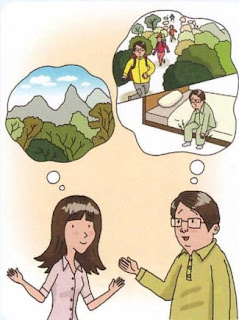가: 지난 주말에 설악산에 다녀왔다면서요? 요즘 단풍철이라 경치가 한창 아름다울 때지요?
Didn’t you go to Mt. Seolak last weekend? Since it’s the season for fall colors, the scenery must have been incredibly beautiful, right?
나: 네, 단풍으로 붉게 물든 설악산은 형용할 수 없으리만치 아름답더라고요. 말 그대로 한 폭의 그림 같다 고나 할까요? 그래서 그렇게 사람들이 설악산을 찾나 봐요.
Yes, Mt. Seolak, with crimson red fall colors (tints), was so beautiful that I can’t even describe how beautiful it was. It was just like a painting. I guess that’s why so many people go to visit Mt. Seolak.
가: 저는 지난번에 설악산 등산을 갔다 오고 나서 며칠 동안 온몸이 쑤시고 아프던데 투안 씨는 어때요? 괜찮아요?
The last time I climbed Mt. Seolak, my entire body was aching for days, but how was it for you, Tuan? Are you all right?
나: 괜찮기는요. 자고 일어나니까 한 걸음도 걸을 수 없으리만치 다리가 당기고 아프더 라고요.
I’m far from all right. I went to sleep, and the next morning, my legs were so sore that I couldn’t even walk one step.
This expression is used to emphasize the content of the following clause by indicating the degree to which the situation or state of affairs in the preceding clause describes it. It is often used in a metaphorical sense.
• 합격자 발표를 앞두고 대기실은 무서우리만치 팽팽한 긴장이 감돌았다.
The waiting room right before the announcement of the successful candidates was so full of tension that it was scary.
• 창밖에는 한 치 앞도 안 보이리만치 폭우가 쏟아지고 있다.
The downpour is so severe that we can’t even see an inch outside through the window.
• 오늘날의 과학 기술은 몇 년 앞을 예측할 수 없으리만치 빠른 속도로 발전하고 있다.
Current scientific technology is advancing so fast that it’s impossible to predict what things will be like even a few years from now.
This expression can be replaced with -(으)리만큼 and -(으)ㄹ 정도로 with no major change in meaning.
• 합격자 발표를 앞두고 대기실은 무서우리만큼 팽팽한 긴장이 감돌았다.
• 합격자 발표를 앞두고 대기실은 무서울 정도로 팽팽한 긴장이 감돌았다.
>> You can click on the title of grammar below to see another grammar which also expresses ‘Degree’
>> Full of ‘Korean grammar in use – Advanced’: Click here
>> Full of ‘Korean grammar in use – Intermediate’: Click here

